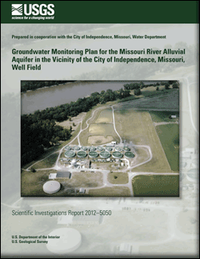Source contributions to monitoring and supply wells, contributing recharge areas, groundwater travel times, and current (2012) understanding of alluvial water quality were used to develop a groundwater monitoring plan for the Missouri River alluvial aquifer in the vicinity of the City of Independence, Missouri well field. The plan was designed to evaluate long-term alluvial water quality and assess potential changes in, and threats to, well-field water quality. Source contributions were determined from an existing groundwater flow model in conjunction with particle-tracking analysis and verified with water-quality data collected from 1997 through 2010 from a network of 68 monitoring wells. Three conjunctive factors - well-field pumpage, Missouri River discharge, and aquifer recharge - largely determined groundwater flow and, therefore, source contributions. The predominant source of groundwater to most monitoring wells and supply wells is the Missouri River, and this was reflected, to some extent, in alluvial water quality. To provide an estimate of the maximum potential lead time available for remedial action, monitoring wells where groundwater travel times from the contributing recharge areas are less than 2 years and predominately singular sources (such as the Missouri River or the land surface) were selected for annual sampling. The sample interval of the remaining wells, which have varying travel times and intermediate mixtures of river and land-surface contributions, were staggered on a 2-, 3-, or 4-year rotation. This was done to provide data from similar contributing areas and account for inherent aquifer variability yet minimize sample redundancy.


